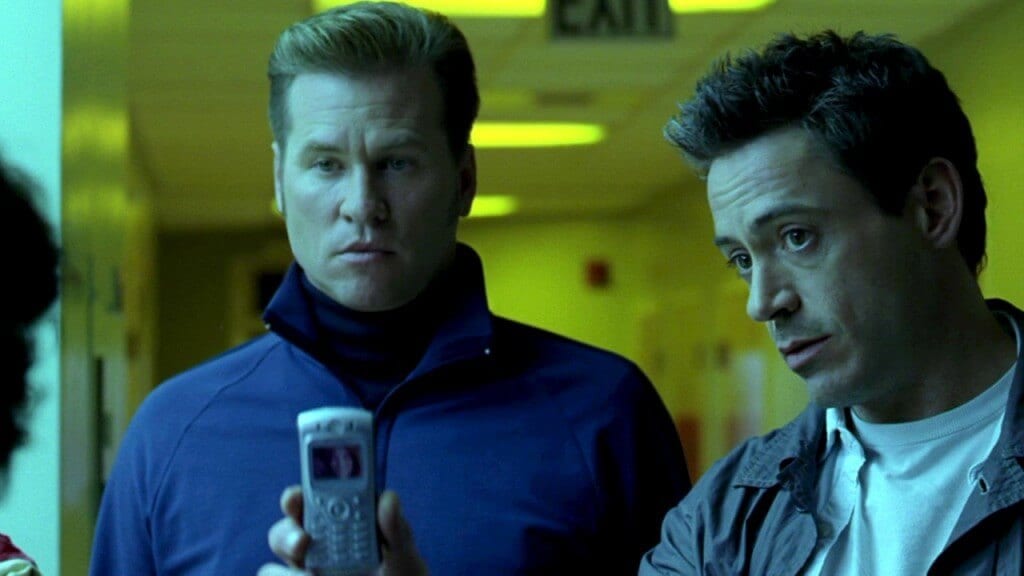Holiday 2014: Kiss Kiss Bang Bang
This is the first installment in our Holiday 2014 Review Series, where we’ll take a look at some of our favorite Christmas movies, either traditional or off-kilter. Grab a glass of your favorite eggnog and enjoy!
Upon its initial theatrical release – which lasted about a week – Kiss Kiss Bang Bang bombed financially, but since then it’s picked up a fervent cult following, and with good reason; it’s a funny, exciting and twisty Christmas noir thriller, written (and, for the first time, directed) by the master of the subgenre, Shane Black.
While running from the cops in New York, petty thief Harry Lockhart (Robert Downey Jr.) accidentally auditions for a movie role. Impressed with his raw performance, the producers fly him out to L.A. and team him with Perry Van Shrike (Val Kilmer), a private detective referred to in Hollywood circles as “Gay Perry,” to teach their new star how to play an authentic gumshoe. While tagging along with Perry on a routine surveillance case, Harry gets caught up in a murder investigation. Then Harmony Faith Lane (Michelle Monaghan), his unrequited childhood love, shows up and asks him to help her find her sister’s killer. Will Harry screw up like he always does, or will Christmas bring his chance for redemption?

*Spoilers!*
Kiss Kiss Bang Bang is a mystery/thriller that subverts the tropes of its genre at every turn. The framework is set by the series of Johnny Gossamer books beloved by Harry and Harmony, a fictional version of the kinds of pulp stories that would today be republished by Hard Case Crime (in a nod to the king of the hard-boiled genre, each chapter title in the film is the title of a Raymond Chandler book), with the two characters constantly observing that their misadventure mirrors the structure of one of the novels. We don’t have to know what, exactly, happens in any of the Johnny Gossamer books because we know them from their many real world counterparts, and they’re all present in the movie – just tweaked. The two cases Harry and Perry are investigating will inevitably intertwine to become one big, confusing mystery, but there are so many twists that one of them turns out to be inconsequential (plotwise, anyway). Perry recounts his initial meeting with a woman who hired him for a surveillance job as a prototypical femme fatale introduction (“She opens the door, she got nothing on but the radio; invites me to sit down, sits on my lap, fires up a smoke…”), only to reveal to a riveted Harry that he was making it up and the truth is much less glamorous (“No, idiot. She hired me over the phone, paid for it with a credit card.”). Harry’s best friend in New York is killed in front of him, just as the hit man sent after Perry is gunned down, but they’re killed not by the expected parties (the police and Perry himself, respectively), but by gun-toting civilians who have nothing to do with the plot. Harry narrates the film, but he fails to convey crucial information, actually chastising himself for it a couple of times. A game of Russian roulette used as an interrogation technique goes very wrong, very quickly. There are many of these fixtures, all given their own postmodern spin.
Through Harry, the film even points out some of the lamer tropes of which the genre is guilty. An early scene very clearly reveals the identity of the villain, and Harry stops the movie in its tracks to deride the writing (“It’s like, ‘Why was that in the movie? Gee, you think maybe it’ll come back later, maybe?’”), even using The Hunt for Red October (a highly acclaimed film) as an example of its pervasiveness. When Perry delivers a threatening line of dialogue to intimidate a thug, Harry points out that it isn’t clear what he’s actually telling the guy to do. Toward the end, Perry – who was last seen bleeding to death on a highway overpass – is revealed to be alive and well, and Harry acknowledges it as a cheap attempt to give the audience a happy ending, going so far as to trot out several other dead characters, followed by Elvis Presley and Abraham Lincoln. Happily, these jabs are all delivered with a wink rather than a sneer and add to the fun instead of interrupting it.

Even the characters themselves are subversive versions of genre archetypes. Harry Lockhart is the “charming rogue,” a streetwise hustler who’s quick with a quip and always ready to jump into action. Problem is, he can’t fight, his charm is lost on virtually everyone and he’s not particularly smart. Early in the film, he walks in on a guy stepping out of line with a girl and calls out the ruffian like your favorite movie tough guy… then gets beaten to a pulp. He can never remember the facts of either mystery, and needs Perry to constantly remind him of what’s going on. He’s framed for murder and accidentally urinates on the corpse. He hits on every pretty girl he meets on his L.A. sojourn and is shot down constantly because they can all tell he’s a lowlife. Even Harmony, the girl whose heart he’s destined to win, rebuffs him almost every time (once he almost has her, then gets drunk and sleeps with her friend instead). He kills a man for the first time and breaks down crying. Until he pulls it together at the end, he fails at every task he attempts, including recovering his own severed finger from a dog. He may think he’s Phillip Marlowe, but he’s really the last guy you want on your case.
Perry Van Shrike, on the other hand, is the very essence of the macho hero. He can outfight and outshoot the bad guys. He’s very smart and able to think his way out of any predicament. He can separate reality from fiction in terms of detective work (he actually has Jenna’s murder solved from the beginning; the novel-like plot is just a distraction). He, unlike Harry, is exactly who you want on your side when the going gets tough; however, also unlike Harry, when the going gets tough, Perry gets going in the opposite direction. He has no interest in risking his life for some case that is, at the end of the day, just a job for him. He’s very selfish, thinking mostly of his own well-being (he warns Harry and Harmony to give up and walk away, but he doesn’t stick around when they don’t listen to him). He gets pulled back in each time Harry unfurls another layer of the plot, perhaps out of professional curiosity, but when the danger escalates, he high-tails it once more.
Then there’s the fact that he’s gay. Gay characters are typically portrayed as effeminate victims in films like this, but Perry is anything but. He’s the toughest guy in the movie, regularly getting not only himself, but straight hero Harry, out of trouble. When he decides to give up his investigation, it isn’t portrayed as cowardly, but prudent, if selfish. He even uses the perception of homosexuality as a weakness to his advantage, manipulating a homophobic bad guy into making a fatal mistake. These are offset by the occasional expected gay characteristics: his cell phone ringtone is “I Will Surive;” his ceramic gun was a “special gift” from his mother; he recognizes an actor as “the star of Xanadu, with Olive Newton-John and Gene Kelly.” He’s a distinctly gay man (in terms of a story like this; of course in real life liking Xanadu or listening to “I Will Survive” has no bearing on your sexuality, but here they’re used as shorthand to identify Perry as gay), but he bucks the stereotype – and, in doing so, the genre trope – at every turn.

Harmony Faith Lane is the “tough broad,” but she’s not a femme fatale. She’s sexual in that she apparently has had a lot of sex, but she doesn’t use her sexuality as a manipulation tool; she just has a sexual appetite (Harry, in his buffoonery, doesn’t understand this and thinks she’s damaged). She’s strong willed, but she isn’t stone cold; she has the drop on one of the hit men and finds she can’t kill him. She’s smart enough to outwit Harlan Dexter’s henchman over the phone, but she can’t outmuscle the guys who capture her during the climax. She’s neither a superheroine nor a damsel in distress, although she has flashes of both at different points in the film. Like the two male leads, she’s a familiar character who defies expectations.
The reason all this works so well is that the characters, beyond their function as archetypes and subversions of those archetypes, are all very likable. Harry’s shortcomings make him much less cool than a typical hard-boiled hero, but they also make him much more relatable. Harry is us (generally). We’re not as cool as we’d like to think. Women aren’t typically interested in us, and when they are we find a way to sabotage it. We can’t fight to save our lives, and if we ever had to kill someone, we’d be emotional wrecks. We don’t catch a lot of details in a convoluted plot and have to have the intricacies explained to us. We’re not exceptional people, and we’re reminded of that every day. We’re also like Perry, usually putting our own self-interests above any higher purpose, as well as embodying few, if any, of the stereotypes afforded to whatever group in which we fall. And, like Harmony, we can be true to ourselves while being judged by those around us, or hurt someone we care about by doing the one thing they asked us not to do. (“You slept with Chook Chutney.”) The heroes of Kiss Kiss Bang Bang behave the way we would behave if we were caught in a story like this, and it’s hard not to love them for it.

Stripped of its commentary, Kiss Kiss Bang Bang is a great noir story. Harry is fun as all get-out – I can’t imagine anyone but Robert Downey Jr. in the role – and, whatever happens to him, he never stops being entertaining. Perry and Harmony are also terrific, and Val Kilmer and Michelle Monaghan do excellent work. Most of the other characters pretty much revolve around the main three, but a few standouts are Larry Miller as the movie producer who brings Harry to L.A. (“See, this is what I’m talking about. Old school. Method. Brando.”), and Dash Mihok and Rockmond Dunbar as the hit men known only as Mr. Frying Pan and Mr. Fire. The pace is quick, the action is spare but hard, and the dialogue is classic Shane Black: fast, funny, and plentiful. It’s an easy movie to enjoy.
Kiss Kiss Bang Bang is a worthy addition to anyone’s Christmas rotation. It works as a deconstruction of hard-boiled crime fiction as well as a thriller in itself, with great characters and a twisting plot, sprinkled with Shane Black’s usual witty dialogue and Christmas setting.






